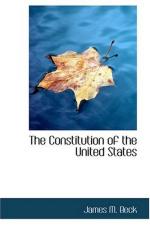Hamilton’s plan was never taken seriously and, so far as the records show, was never afterwards considered. His admirers have given great praise to his work in the federal convention. His real contribution lay in the fact that when the Constitution was finally drafted and offered to the people, while he regarded it as a “wretched makeshift,” to use his own expression, yet he was broad and patriotic enough to surrender his own views and advocate the adoption of the Constitution. In so doing, he fought a valorous fight, secured the acquiescence of the State of New York, and without its ratification the Constitution would never have been adopted. Hamilton later thought better of the Constitution, and its successful beginning is due in large measure to his genius for constructive administration.
As the debate proceeded, the crisis precipitated by the seemingly insoluble differences between the great and little States became more acute. The smaller States contended that the convention was transgressing its powers, and they demanded that the credentials of the various members be read. In this there was technical accuracy, for the delegates had been appointed to revise the Articles of Confederation and not to adopt a new Constitution. A majority of the convention, however, insisted upon the convention proceeding with the consideration of a new Constitution, and their views prevailed. It speaks well for the honour of the delegates that although their differences became so acute as to lead at times to bitter expressions, neither side divulged them to the outside public. The smaller States could easily have ended the convention by an appeal to public opinion, which was not then prepared for a “consolidated union,” but they were loyal enough to fight out their quarrels within the walls of the convention hall.




